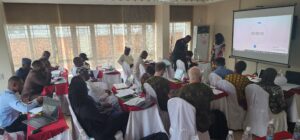The annual retreat of the Action Group on Free Civic Space (AGFCS), held on March 21 and 22, heralded the third year of the Security Playbook Project supported by the Fund for Global Human Rights. The retreat marked the end of the 2022 project year during which 18 organizations implemented 42 activities and projects aimed at countering the security-related drivers of the shrinking of civic space in Nigeria. In every geopolitical zone of Nigeria, activities were carried out to address the specific security issues limiting the operating space for civil society in each region.
The first day of the retreat featured reflections, discussions, and mutual learning among the 18 implementing organizations, donor representatives, media allies, and the AGFCS Secretariat, Spaces for Change. Together, they evaluated all the projects executed during the year 2022, while co-ideating, planning, and strategizing for the year 2023-2024. Some of the activities implemented include facilitating multistakeholder dialogues that involved security personnel, civil society organizations, the private sector, non-state actors, victims of civic space repression, and other civic space actors.
Other activities include the simplification and visualization of the research findings contained in the three “Security Playbook” reports into information, educational, and communication (IEC) materials and translating them into 7 different local languages (Yoruba, Hausa, Igbo, Pidgin, Fulfulde, Jukun, Mumuye)and PWD format. Some organizations initiated weekly radio programs in the North-West, South-West, South-South, and South-East regions of the country while some outreaches targeted minority groups such as persons living with disabilities (PWDs), the LGBTQ+ community, women, and young people). Some groups engaged in regional and international advocacy to inform the reform of the global counter-terrorism (CT) norms and also contribute to hard security discourse globally.
Beyond the litany of success stories, there were also challenges caused by many factors such as limited access to power, the 2023 general elections, fear of reprisals, high staff turnover within implementing organizations, cultural and language barriers, inflation, and so forth. Sharing these challenges also served as a learning point for others. With these learnings in mind, the group collectively agreed to consolidate the wins of the last year and design new interventions that address the identified gaps in the coming year. The second day of the retreat was dedicated to team ideation, co-creation and participatory process designs. Combining the strategic programmatic direction outlined in the “Civic Future Strategic Framework” with the evidence generated from the Closing Spaces database and the research findings from the three Security Playbook reports, members pitched numerous ideas and new initiatives that employ a multifaceted strategy to defend the civic space from frequent onslaughts unleashed in the name of security. The new activities will usher in the third phase of project implementation to disrupt, reform, transform and counter the misuse of the security architecture in Nigeria.
After long hours of reflective sessions on the successes, challenges, and learnings from the second year of implementing the “Civic Space and Security Project”, participants also benefitted from dedicated presentations designed to build members’ financial reporting, evidence-building, and safeguarding capacities. It wasn’t just a retreat, but a reunion of sorts to revitalize collective action and deepen solidarity to reclaim the civic space in different parts of the country. The meeting rounded up on a note of solidarity, hope, and renewed strength to continue their respective advocacy campaigns across the country.




